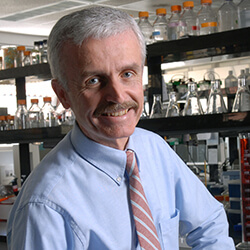Christopher Glembotski, PhD, Appointed Director of the Center of Translational Cardiovascular Research
After an extensive national search, Christopher Glembotski, PhD, will be joining the University of Arizona College of Medicine – Phoenix as the inaugural director for the Translational Cardiovascular Research Center and professor in the Department of Internal Medicine.

Dr. Glembotski currently serves as the director of the San Diego State University (SDSU) Heart Institute and is distinguished professor of biology. Dr. Glembotski has an extensive research background and has garnered more than $35 million in grants during his time at SDSU. Since he started his own lab in 1983, he has been continuously funded by the National Institutes of Health.
Dr. Glembotski has been recognized as an educator and researcher with several accolades that include receiving the American Heart Association Established Investigator Award, the Albert W. Johnson Research Lectureship Award and being named Distinguished Professor of Biology in 2019, SDSU’s highest research honor. Other noteworthy honors and accomplishments include the Outstanding Faculty Award by SDSU Mortar Board in 2016; Most Influential Professor Award by SDSU Department of Biology in 2004, and Outstanding NIH Minority Biomedical Research Support Faculty Member in 2004.
His research centers around the area of molecular cardiology, with a focus on identifying new therapeutics for treating ischemic and hypertrophic cardiomyopathies.
Currently, Dr. Glembotski’s lab uses gene therapy and small molecule approaches to improve protein-folding and to decrease protein aggregation in the hearts of patients suffering from numerous types of cardiac pathologies. Recent efforts in his lab have used a chemical biology approach to find new compounds that improve the natural defense mechanisms in the heart, which could reduce heart damage in patients suffering from a heart attack and could improve the outcomes in patients diagnosed with heart failure. The compounds identified to date have beneficial effects on the heart, as well as in the preliminary models of ischemic stroke.
The most promising compound to date, which Dr. Glembotski’s lab has patented, has been shown to serve these beneficial effects by activating ATF6, a protein that Dr. Glembotski’s lab found in heart cells that is a master regulator of a widespread protective gene program. This protein is expressed in every organ, including the brain, so the compounds Dr. Glembotski’s lab has discovered could have benefits for a broad spectrum of cardiovascular diseases.
Dr. Glembotski earned a bachelor’s degree in biochemistry from California Polytechnic State University at San Luis Obispo, CA, and a doctorate in biochemistry from the University of California, Los Angeles. He continued his studies at the University of Colorado Health Sciences Center in Denver as a postdoctoral fellow in molecular physiology and moved to his first faculty position as professor of pharmacology at the Perelman School of Medicine at the University of Pennsylvania in Philadelphia before relocating to San Diego to become director of the SDSU Heart Institute.
About the College
Founded in 2007, the University of Arizona College of Medicine – Phoenix inspires and trains exemplary physicians, scientists and leaders to advance its core missions in education, research, clinical care and service to communities across Arizona. The college’s strength lies in our collaborations and partnerships with clinical affiliates, community organizations and industry sponsors. With our primary affiliate, Banner Health, we are recognized as the premier academic medical center in Phoenix. As an anchor institution of the Phoenix Bioscience Core, the college is home to signature research programs in neurosciences, cardiopulmonary diseases, immunology, informatics and metabolism. These focus areas uniquely position us to drive biomedical research and bolster economic development in the region.
As an urban institution with strong roots in rural and tribal health, the college has graduated more than 1,000 physicians and matriculates 130 students each year. Greater than 60% of matriculating students are from Arizona and many continue training at our GME sponsored residency programs, ultimately pursuing local academic and community-based opportunities. While our traditional four-year program continues to thrive, we will launch our recently approved accelerated three-year medical student curriculum with exclusive focus on primary care. This program is designed to further enhance workforce retention needs across Arizona.
The college has embarked on our strategic plan for 2025 to 2030. Learn more.